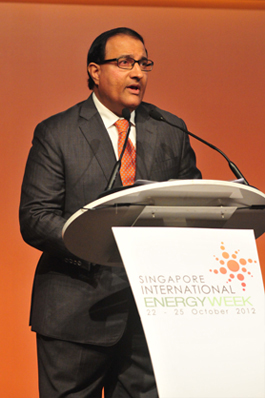
(Photo credit: Energy Market Authority)
Singapore's LNG terminal is on track to commence commercial operations this quarter, and the government has started looking to put in place a robust LNG import framework, said S Iswaran, Singapore's Minister in the Prime Minister's Office and Second Minister for Home Affairs & Trade and Industry.
Speaking at the inaugural KPMG Global Energy Conference and the opening of KPMG's Global Energy Institute for Asia in Singapore on 25 April, Minister Iswaran said Singapore has relied almost entirely on piped natural gas for its power generation and industrial needs so far. With the commissioning of the LNG terminal on Jurong Island, Singapore will now be able to access LNG from global gas markets, diversify its energy sources beyond the region, and benefit from trends in the global gas market.
With its first two tanks, the terminal will possess an initial throughput capacity of 3.5 million tonnes per annum (Mtpa). By the end of the year, this will increase to 6Mtpa when the third tank is completed. When a proposed fourth tank is completed, the terminal's capacity will rise to about 9Mtpa. The government's vision is for the expanded LNG infrastructure to not only provide the storage capacity required to meet industry needs, but to also catalyse business opportunities in LNG trading, break-bulk services and LNG bunkering.
So far, Minister Iswaran noted that the take-up rate for LNG has exceeded expectations, with power generation companies and industries having committed to purchasing around 2.7Mtpa of LNG, or about 90 percent of the first tranche of LNG. He added that the time is thus right for the government to start planning beyond the first tranche of LNG supply. Among its key measures are a plan to set in place a robust LNG import framework that achieves Singapore's objectives of energy security and diversity, taking into the following key considerations:
- The future procurement framework for LNG must be able to meet future demand. Even though Singapore's incremental gas demand in the near term may be relatively small, its total demand for gas may rise to about 15Mtpa by 2024.
- Future LNG import should enhance the price competitiveness of Singapore's gas supply and minimise volatility. This can be achieved through a diversified portfolio of LNG from multiple supply sources and, where possible, a blend of contract durations and price indexation.
- The future LNG import framework should take into consideration the available capacity and operational efficiency of the LNG terminal, and the number of users it can effectively accommodate.
- The framework should allow Singapore's domestic end users to benefit from opportunities arising from developments in the global gas market, such as the emergence of new gas supplies and movements in gas prices.
The Singapore government's move to plan for an LNG import framework comes in the wake of a consultation paper published by the Energy Market Authority last year, which maps out two options for the city-state's future import of LNG. The first option is to adopt the regulated sole importer (RSI) framework that is already in use in several Asian LNG importers such as South Korea, Japan, Taiwan and Thailand. Under this framework, an RSI is tasked with procuring all future LNG demand for end-users in the country. , This is a process that simplifies negotiations on terminal access and operational issues.
The second option is the multiple aggregator framework adopted in the EU and the US. Under this model, importers would be either appointed by EMA through a competitive Request-for-Proposal (RFP) process or emerge from the natural process of market competition.
The publication of the consultation paper sparked a lively discussion, with some industry players arguing that demand aggregation under a sole importer would allow for a scale-in procurement that could help to secure more favourable LNG prices and terms. Others were more concerned that a sole importer might not be able to secure the most competitive terms for end-users, making the case that multiple aggregators will allow for price discovery, and that recent empirical data suggests there are limits to the price advantage which can be accrued to volume buyers.
The Minister concluded his address by noting that consultancies such as KPMG play an important role in helping companies leverage growth opportunities and achieve greater efficiency in an increasingly complex energy landscape. Singapore, he pointed out, has become an energy hub in the region, and KPMG's Global Energy Institute for Asia will come to occupy an important role in the country's energy ecosystem.